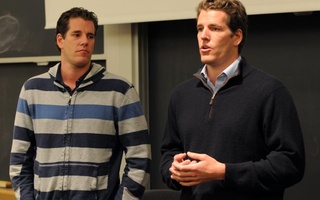Following a report last week that someone in the Harvard community was misusing high power computing resources for ‘Dogecoin’ mining, John C. Lo ’16 received what he called a “strange” email from an alleged alumnus who goes under the name ‘John Harvard Bitcoin’—an email that led to a meeting with other Bitcoin enthusiasts Wednesday night.
Bitcoin is a decentralized digital currency that can be “mined” with sophisticated computer algorithms, similarl to Dogecoin, the virtual currency at the heart of the controversy last week.
“Are you the secret DOGE miner? I just started the Harvard Bitcoin Club and would like to invite you to join. The goal is to start an ‘open club’ that promotes Bitcoin education,” the supposed alumnus, ‘John Harvard Bitcoin,’ wrote to Lo last week.
Lo said that he was at first skeptical of the sudden contact by someone who would not provide his real name and who he had never contacted before.
“I was curious, if not apprehensive about this guy…. This all seemed very, very sketchy,” Lo said. “It’s really an enigma because I’m not sure who he is or what he does. But he seems to be a prominent figure in the Bitcoin community.”
The Crimson has been unable to confirm the supposed alumnus's identity despite repeated contact.
At the direction of ‘John Harvard Bitcoin,’ Lo, along with a few students from the College and the Harvard Business School, met at Clover Wednesday night to discuss the virtual currency and view the Bitcoin ATM from LibertyTeller, which was recently installed in Boston. It was the group's second meeting.
While ‘John Harvard Bitcoin’ was not in attendance at the club's meeting, Lo said that the alumnus told him he would fund the meeting and reimburse individuals for the cost of food in Bitcoin.
Meeting attendees discussed the future of Bitcoin and its potential to become a widely used virtual currency, especially in light of the recent shutdown of Mt. Gox, the largest Bitcoin exchange in the world before its closing earlier this week. Reports estimate that nearly 750,000 bitcoins, worth approximately $350 million, had been stolen from the exchange over a period of three years.
Despite the ongoing talk about the implications of the recent closure, Business School student Sarina Siddhanti, who was at the Clover meeting, said she believes that Bitcoin can become a popular currency.
“I absolutely think…if anything is best poised [to be a currency] it is Bitcoin right now,” she said.
Chris Yim, co-founder of LibertyTeller, a company that produced a Bitcoin ATM, transported the ATM from its South Station location to Cambridge for the meeting. Yim discussed the possibility of bringing an ATM to Harvard.
“We are focused on the first location now...but we have a lot of interest in Kendall and Harvard Square and are excited to put some more machines out there,” he said.
He went on to speak about the perceived value of Bitcoin as a legitimate currency.
“Currency is only as valuable as people are willing to accept it and transact with it,” Yim said.
Bitcoin Club members expressed hope for the future and value of Bitcoin.
“Bitcoin is like a mirror and anyone who looks into it sees some reflection of himself or what he wants from Bitcoin,” Lo said.
—Staff writer Theodore R. Delwiche can be reached at theodore.delwiche@thecrimson.com.
Read more in College News
Trumpets Herald New Office of the Arts Ceramics Studio in AllstonRecommended Articles
-
 Winklevi Invest in Anonymity
Winklevi Invest in Anonymity -
 Winklevi Finally Vindicated?
Winklevi Finally Vindicated? -
Clover Welcomes Harvard Square’s First Bitcoin ATMClover Food Lab, a vegetarian and vegan restaurant chain, installed the first Bitcoin ATM in Harvard Square Monday morning.
-
The Bitcoin BroThe tech industry prides itself on shaping the future of our society. But when bitcoin bros are in charge, what we end up with is a vision of a future where women are marginalized and subjugated.
-
 The Best of Datamatch 2018
The Best of Datamatch 2018













